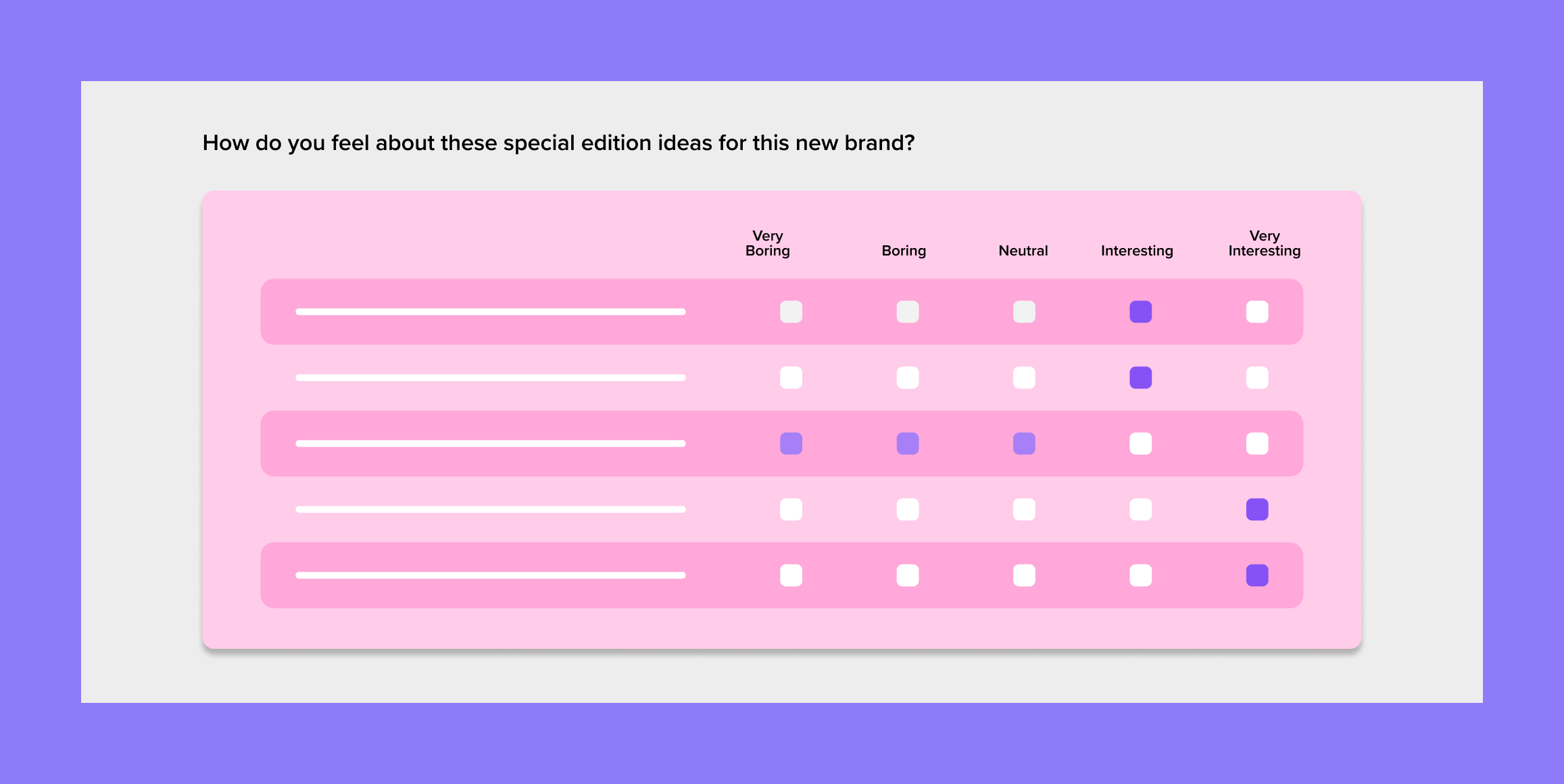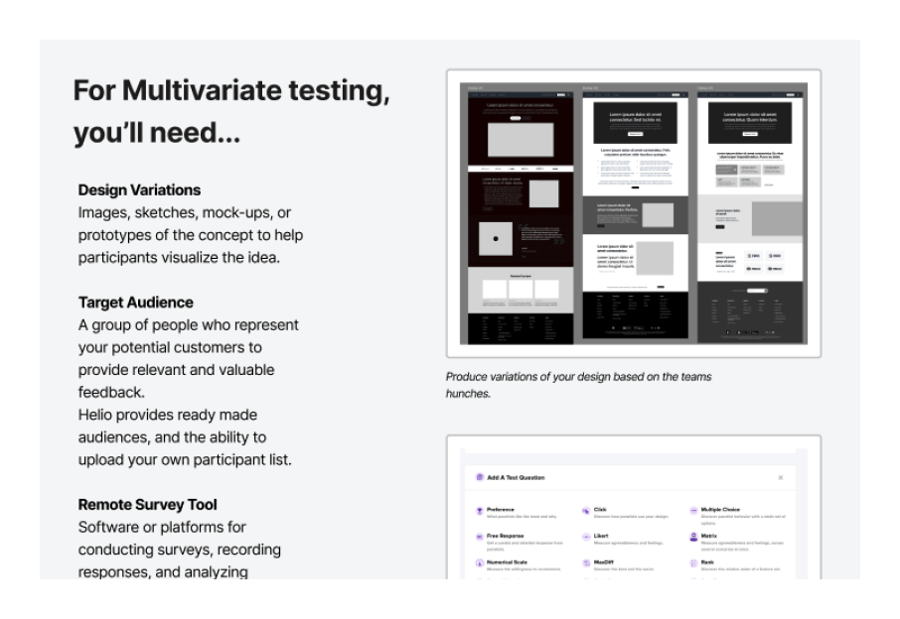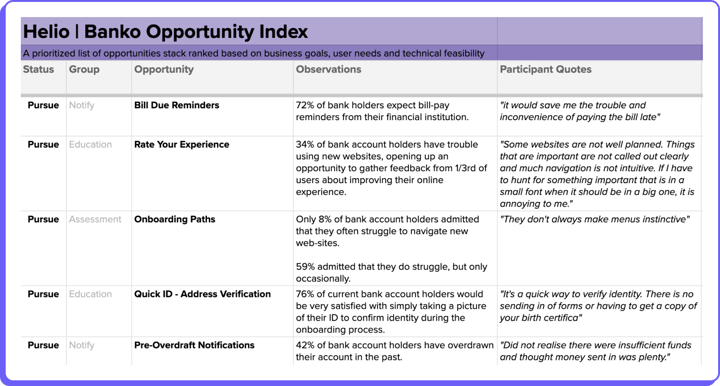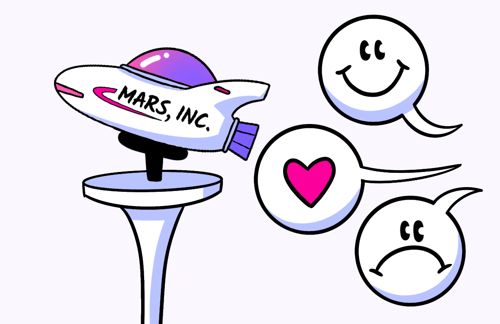Test your ideas with market feedback
Gather market feedback on your early ideas to refine concepts and enhance product development.


Prioritize High-Potential Ideas
Get feedback from your target audience to identify which ideas have the most potential. Focus your resources on what matters most.
Reduce Risk
Validate your concepts early to avoid investing in ideas that may not succeed. Minimize risk and make informed decisions.
Accelerate Time to Market
Streamline your development process by validating and prioritizing ideas early. Quickly bring successful products to market.
Map to UX Metrics
Usability
Feeling
Usefulness
Explore a Relevant Case Study
How to Identify and Validate Opportunities

Define Your Research Objectives and Methods
Determine what you want to learn about your idea. This might include understanding potential customer interest, identifying strengths and weaknesses, and assessing market fit.
Depending on your needs, you might use surveys, focus groups, or online panels. Utilize Helio for distributing surveys and collecting data efficiently.

Design and Analyze Your Questionnaire
Ask about initial impressions, interest level, perceived uniqueness, specific features, or open-ended questions for qualitative insights.
Use quantitative methods to identify patterns and qualitative methods to gain deeper insights. Utilize Helio’s visualization tools to create graphs and charts that represent your data clearly.

Implement, Monitor, and Measure
Implement, Monitor, and Measure
Business questions that can be addressed with idea validation
Here are some common business questions product and marketing leaders ask that can be addressed with brand tracking
Helio uses methods like surveys, interviews, and prototype testing to gather real-time feedback from users. This helps you discover which ideas are most appealing and likely to succeed. By analyzing user responses, Helio identifies strengths and areas for improvement.
Helio ensures only the best ideas move forward through continuous testing and iteration. This process saves time and resources, increasing the chances of creating products that meet user needs and preferences.
Idea validation is key to finding out what makes new ideas successful.
Helio uses surveys and prototype testing to gather feedback from potential users. This helps us see which parts of an idea are most appealing and which need improvement. Important factors include usability, relevance to user needs, and overall appeal.
By constantly testing and refining based on user feedback, Helio makes sure only the best ideas move forward. This saves time and resources, helping you create products that meet user needs.
Refining ideas with market feedback is crucial for creating successful products, and Helio makes this process seamless.
Helio collects feedback through surveys and prototype testing, revealing user preferences and identifying what works and needs improvement. These insights guide targeted refinements to meet user needs better.
By continuously iterating on ideas based on this feedback, Helio ensures the final product aligns with market expectations. This process improves usability, relevance, and overall appeal, boosting the potential success of your product.
Helio uses surveys and prototype testing to gather feedback from potential users. This helps identify barriers like usability issues, lack of relevance to user needs, and poor overall appeal. Understanding these obstacles allows us to make targeted improvements to overcome them.
Helio addresses these barriers early in the development process by continuously iterating based on user feedback. This leads to a more refined, user-friendly product that meets market expectations and reduces the risk of rejection.
The speed at which we receive data is significantly faster than what we’ve experienced with traditional market research.

Kevin Dunn, LevLane
Testing Template Example
FAQs
Idea validation involves testing early-stage concepts with a target audience to gather feedback and assess their potential success. This process helps identify which ideas resonate with users and which need refinement, ensuring that only the most promising concepts progress in development.
Idea validation is crucial because it ensures that your concepts align with market needs. It reduces the risk of investing time and resources into ideas that may not succeed. By validating ideas early, businesses can make informed decisions, improve product relevance, and enhance overall market fit.
Common methods include surveys, which collect quantitative data on user preferences and opinions; interviews, which gain qualitative insights through detailed conversations with users; concept testing, which presents different ideas to target audiences and measures their reactions; and feedback analysis, which analyzes responses to identify patterns and preferences.
Idea validation specifically assesses early-stage concepts’ viability and potential success, focusing on user acceptance and market fit. In contrast, other research types might address broader issues, such as overall market trends, customer satisfaction, or detailed product usability.
Challenges include gathering representative feedback, ensuring it is comprehensive and reflects the target audience; interpreting diverse opinions, balancing differing user perspectives to find common ground; and integrating feedback, effectively incorporating insights into the development process without derailing the project.
To ensure accurate interpretation, businesses should engage experienced researchers to design and conduct studies, validate findings across multiple data sources to confirm trends and be mindful of biases that could skew interpretations.
Businesses can use validation insights to refine ideas by adjusting and improving concepts based on user feedback, prioritize development by focusing resources on the most promising ideas, and align marketing strategies by tailoring messages to emphasize validated concepts that resonate with the target audience.
Effective idea validation leads to targeted products that better meet market needs, reduced time to market by streamlining the development process and focusing on successful ideas, and higher acceptance rates, which increase the likelihood of market acceptance and success.







